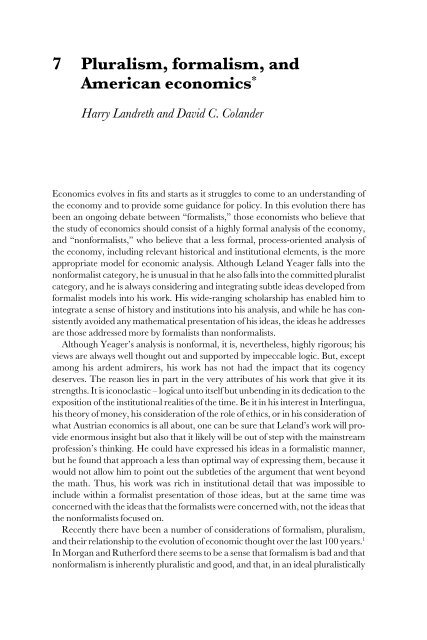Money and Markets: Essays in Honor of Leland B. Yeager
Money and Markets: Essays in Honor of Leland B. Yeager
Money and Markets: Essays in Honor of Leland B. Yeager
You also want an ePaper? Increase the reach of your titles
YUMPU automatically turns print PDFs into web optimized ePapers that Google loves.
7 Pluralism, formalism, <strong>and</strong>American economics *Harry L<strong>and</strong>reth <strong>and</strong> David C. Col<strong>and</strong>erEconomics evolves <strong>in</strong> fits <strong>and</strong> starts as it struggles to come to an underst<strong>and</strong><strong>in</strong>g <strong>of</strong>the economy <strong>and</strong> to provide some guidance for policy. In this evolution there hasbeen an ongo<strong>in</strong>g debate between “formalists,” those economists who believe thatthe study <strong>of</strong> economics should consist <strong>of</strong> a highly formal analysis <strong>of</strong> the economy,<strong>and</strong> “nonformalists,” who believe that a less formal, process-oriented analysis <strong>of</strong>the economy, <strong>in</strong>clud<strong>in</strong>g relevant historical <strong>and</strong> <strong>in</strong>stitutional elements, is the moreappropriate model for economic analysis. Although Lel<strong>and</strong> <strong>Yeager</strong> falls <strong>in</strong>to thenonformalist category, he is unusual <strong>in</strong> that he also falls <strong>in</strong>to the committed pluralistcategory, <strong>and</strong> he is always consider<strong>in</strong>g <strong>and</strong> <strong>in</strong>tegrat<strong>in</strong>g subtle ideas developed fromformalist models <strong>in</strong>to his work. His wide-rang<strong>in</strong>g scholarship has enabled him to<strong>in</strong>tegrate a sense <strong>of</strong> history <strong>and</strong> <strong>in</strong>stitutions <strong>in</strong>to his analysis, <strong>and</strong> while he has consistentlyavoided any mathematical presentation <strong>of</strong> his ideas, the ideas he addressesare those addressed more by formalists than nonformalists.Although <strong>Yeager</strong>’s analysis is nonformal, it is, nevertheless, highly rigorous; hisviews are always well thought out <strong>and</strong> supported by impeccable logic. But, exceptamong his ardent admirers, his work has not had the impact that its cogencydeserves. The reason lies <strong>in</strong> part <strong>in</strong> the very attributes <strong>of</strong> his work that give it itsstrengths. It is iconoclastic – logical unto itself but unbend<strong>in</strong>g <strong>in</strong> its dedication to theexposition <strong>of</strong> the <strong>in</strong>stitutional realities <strong>of</strong> the time. Be it <strong>in</strong> his <strong>in</strong>terest <strong>in</strong> Interl<strong>in</strong>gua,his theory <strong>of</strong> money, his consideration <strong>of</strong> the role <strong>of</strong> ethics, or <strong>in</strong> his consideration <strong>of</strong>what Austrian economics is all about, one can be sure that Lel<strong>and</strong>’s work will provideenormous <strong>in</strong>sight but also that it likely will be out <strong>of</strong> step with the ma<strong>in</strong>streampr<strong>of</strong>ession’s th<strong>in</strong>k<strong>in</strong>g. He could have expressed his ideas <strong>in</strong> a formalistic manner,but he found that approach a less than optimal way <strong>of</strong> express<strong>in</strong>g them, because itwould not allow him to po<strong>in</strong>t out the subtleties <strong>of</strong> the argument that went beyondthe math. Thus, his work was rich <strong>in</strong> <strong>in</strong>stitutional detail that was impossible to<strong>in</strong>clude with<strong>in</strong> a formalist presentation <strong>of</strong> those ideas, but at the same time wasconcerned with the ideas that the formalists were concerned with, not the ideas thatthe nonformalists focused on.Recently there have been a number <strong>of</strong> considerations <strong>of</strong> formalism, pluralism,<strong>and</strong> their relationship to the evolution <strong>of</strong> economic thought over the last 100 years. 1In Morgan <strong>and</strong> Rutherford there seems to be a sense that formalism is bad <strong>and</strong> thatnonformalism is <strong>in</strong>herently pluralistic <strong>and</strong> good, <strong>and</strong> that, <strong>in</strong> an ideal pluralistically
















